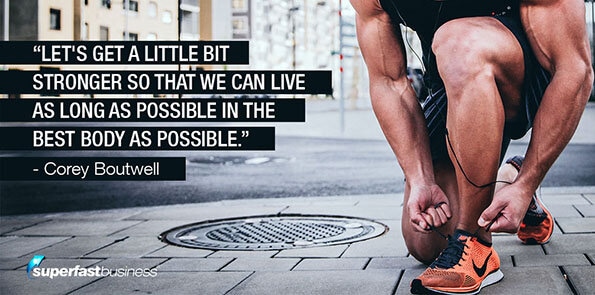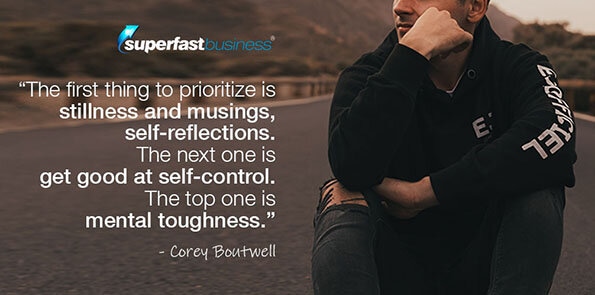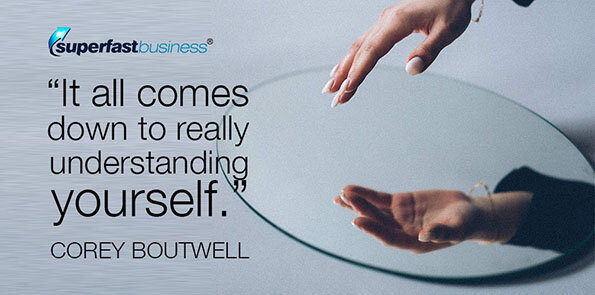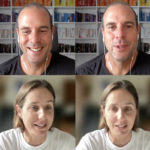Do you want to be the best version of yourself? Corey Boutwell thinks the key to high performance and success is something often overlooked.
Tune in as he and James discuss the mind-body connection and how taking care of yourself physically pays off in mental clarity and overall effectiveness in life.
Podcast: Download (Duration: 37:52 — 34.8MB)
Get Notified Of Future Episodes Apple Podcasts | Spotify | Amazon Music | Android | Blubrry | Gaana | TuneIn | Deezer | Anghami | RSS | More
Interview highlights:
02:34 – A resistance to tradition. Corey knew there was something wrong with the typical business culture.
04:31 – Our guest’s bodybuilding background. From competition to competition, Corey traces his journey through the bodybuilding circuit.
07:31 – Supplements and optimization. How do you improve yourself physically while keeping it organic?
13:13 – Where to go to learn more. If you’re interested thus far in Corey’s intel, here’s where to go.
14:47 – The kind of people Corey helps. It’s not about making people look good.
17:03 – When you’re up against someone’s conditioning. James meets serious resistance to his way of thinking…
23:18 – A diagram for wellness. Discover the hierarchy of priorities for healthy living.
30:15 – Wellness tips for the busy entrepreneur. Here’s a couple of action steps for the listener.
Let James help you build the business you need for a life you enjoy
About a quarter of the topics this show tackles has to do with self-effectiveness. If you’re not at your optimum physically and mentally, it can be hard to succeed in business. And to offer an experienced take on the subject, James has invited learning and development advisor Corey Boutwell.
Corey recently had James on his own podcast, and has an amazing community of young entrepreneurs who are crushing their business and life goals. Corey’s audience, says James, excite him with their discipline, not just in business and work, but in health and fitness.
A resistance to tradition
At just 28, Corey has had a journey to become the influencer he is. He took up business in university, and entered a traditional job, which he didn’t love.
One thing that bothered him was the health of the people working with him. Prior to getting a job, Corey had put much research and work into optimizing himself physically. Looking around, he felt people could be working better and getting more done if they were healthier.
He brought this up with a leadership trainer, Scott Wayne, who agreed with studies that showed people were much more productive, efficient and happy when they’d sorted out their health. That started Corey thinking. He researched the topic endlessly, and started doing presentations on what he’d found.
Our guest’s bodybuilding background
It’s not obvious in this video, but Corey has done a lot of work on his body, and has competed in numerous bodybuilding competitions.
His first comp was at age 22. He’d started training at age 17 in his home gym, and it wasn’t till he joined an outside gym that people encouraged him to compete. He entered an ICN or INBA competition, which was natural bodybuilding. He came in second in novice, and first in the men’s category. There was another men’s comp where he also came in first, and then went to the overalls, his first taste of victory.
Comps have always been for Corey less a chance to show off and more a display of hard work, because, he says, to change your body composition is just ridiculous. And one of the great things that people don’t always know is that fat loss and bodily health directly correlate to brain performance and productivity.
One thing he found after his first competition was that he’d been extremely productive and happy. A lot of things in his life just went well. And when he stopped competing, things were not as great. So he’d set another comp as goal and spend two years again training.
Since then, he’s competed in a PCA competition, in the physique category, and gotten first in Australia for that. He then went big league, competing in the WBFF in 2019. He put heart and soul into his prep, and did it as healthy as possible, which was key. Everything in his life, he said, just went really well, and he made so much personal growth that he needed to share it with other people.
As he trained, Corey gained insight into how to upgrade his mind and consciousness to make the best decisions and be a better version of himself mentally, not just physically. He did a lot of manifestation, meditation and visualization. And he won that WBFF competition.
Corey hasn’t stopped since, and it’s been a good excuse, he says, not just for self-validation, but to share what he’s learned with everyone else, which is what he does now.
Supplements and optimization
All through his training and competition, Corey has used zero performance-enhancing substances. James wonders, has he observed that people who “cheat” get less of the payoff he’s experienced, in terms of feeling good and having momentum?
It depends, says Cory, because there are just too many drugs out there.
James has observed people his own age taking testosterone to boost their motivation. He’s looking for a kind of metaphor, because the organic path, as Corey has said, seems to be helping him in all aspects of life. James would say the way he’s done business for the last decade has also been organic. In the trenches, doing his podcast and helping customers in his forum, has been his core recipe.
“Life just seems to get better when you are exercising.”
He opted not to use performance enhancers like big launches, massive affiliate programs, or reciprocal mailings, which has resulted in, he feels, a more natural version of business. And he can see that happening to Corey – life just seems to get better when you are doing the exercise.
Another thing James likes is the way Corey questions stereotypes around fitness – Do people still think you need to have boiled chicken and rice? Is that still a thing? he asks, while ripping into a can of sardines.
For sure, says Corey. And one thing he’d like to speak to, if people are to use substances like testosterone, is do the organic stuff first. It’s the same as in business. Get yourself in peak health optimal condition, because anything else to enhance that will be stress on the body, like financial stress on a business.
And when it comes to food, Corey suggests getting a DNA test. You can go to DNAfit.com, it costs a couple of hundred dollars, and you’ll get a complete report of what you should be eating. Eat what they recommend and see how it feels – he’s betting you’ll feel 10 times better.
 You want to optimize yourself, says Corey, by getting a little bit leaner, to activate anti-aging pathways and brain activity, get your body continuously removing toxins. And then, let’s get a little bit stronger, he says, so that we can live as long as possible in the best body as possible. Strength training directly correlates to how long you’re going to live and how much energy you can have.
You want to optimize yourself, says Corey, by getting a little bit leaner, to activate anti-aging pathways and brain activity, get your body continuously removing toxins. And then, let’s get a little bit stronger, he says, so that we can live as long as possible in the best body as possible. Strength training directly correlates to how long you’re going to live and how much energy you can have.
Once you figure out what you should be eating, you can manipulate it a little. For example, to calm your stress levels, Corey recommends a high-quality carb with B vitamins. This can be quinoa, mung bean, or nutritional yeast. When stress levels drop, you can get a good sleep. You wake up feeling fantastic and ready to go again.
Where to go to learn more
James follows Corey’s Instagram account, and is learning plenty from it, which is why Corey is on the show. Where can people go to get this great info?
Instagram is just Corey Boutwell. Corey also has a podcast called Corey Boutwell Podcast. A lot of his first episodes, he says, are about optimizing the body, and the latest have been more into the spiritual mindset side of things.
He has a website, coreyboutwell.com. A lot of articles there are extremely useful, with little screenshots of shopping lists or such.
“When you’re getting advice, pay attention to who’s giving it.”
Like James’s grandfather used to tll him, when you’re getting advice, pay attention to who’s giving it. And what he likes about Corey’s information is that he just looks healthy. He has a great personality and mood and demeanor, and James can see how integrated he is physically and mentally.
The kind of people Corey helps
One would naturally assume Corey helps people keen to look good on stage. But that’s not who he’s doing most of his work with.
A lot of the people who reach out to Corey are entrepreneurs who have had business success, financial success, some sort of success in their life, but they’re at a point where they want to invest in themselves, to become better versions of who they are.
Because of research and self-reflection and programs, all the time and energy and focus Corey has spent on such things, he’s developed a base range of knowledge that allows him to help these people. And while he’s not trying to boast, he’s proud of the integration he’s achieved in himself. He tries to be as authentic and vulnerable as possible, and people can see that and ask how he does it.
There’s a lot involved in terms of relationships, self-confidence, physiological stuff with mind and body. There’s figuring out where you want to go, the impact you want to create, what hierarchies you’re climbing. There’s a lot of different exercises where they dive deep into someone, because people want someone who’s authentic, who can hold them accountable, and not beat them up, and just have their backs with different things.
That’s where Corey steps in, to help people optimize themselves and use little techniques from a wide range of sources. And it works.
He’s like their spotter, says James.
Yeah, like a life spotter, Corey agrees. That’s a great way to put it.
When you’re up against someone’s conditioning
One of the things James does on Facebook these days is give away access to a 30-day challenge. The promise is one tip per day from his book, Work Less Make More, emailed to you each day for the next 30 days. A new technique every day for a month till you achieve the goal. Start now. That’s the ad. And it’s free.
James got a comment from someone in the fitness industry, saying he must think people naive to believe they can work less to make more. James, he said, obviously does not own a small business, or he’d see how foolish it is.
James challenged him to read the book and go through the training, saying he’d founded, run and coached many a small business, and would be happy to share his findings.
The commenter owns a fitness center, which is open from 5am to 11pm, seven days a week. He works over 80 hours a week, like many small business owners. And he doesn’t tolerate anyone who thinks they know but have never done the hard yards.
I feel for you, James answered. And as a young man with a family, he said, he’d worked more hours, and walked the miles. Instead of wearing hard work as a badge, why not be open enough to see that others are doing well without working as hard? They understand the leverage, which James is teaching for free. If this person continues to slave away, it’s because he chooses to. If he doesn’t like people who think they know without doing the hard yards, then go through the training and tell James if it was useful or not.
What does Corey take from this exchange?
From his personal perspective, it’s like this person has a negative and a positive charge with who he identifies with. He currently identifies with hard work as reward, which was probably preconditioned by a parent or guardian.
He has a negative charge in terms of, you can’t do these things because you have to do hard work. Then a positive charge is he will be proud to identify with someone who does hard work.
One thing Corey can say is, to convince someone like that otherwise, firstly, it’s not going to be simple. It’s going to be a lot of work and a lot of introspective type of conversation to eventually get him to an aha moment, because he’s built up some resistance. And unraveling those walls, he says, you’re really going to have to relate to him with a few different things.
A diagram for wellness
But one of the things Corey likes to discuss with his clients, when they’re super busy, have been working too hard and are stressing themselves out, with apparently no way out, is to do the exact opposite – literally scheduling in some time for stillness.
 He’s created a diagram, sort of a hierarchy of prioritizations. The first step is physiological needs, in terms of mind and body, which he’s put together. And he’s made a circle diagram, which is like an energy flow. The first thing to prioritize is stillness and musings, self-reflections. The next one is to get good at self-control. The top one is mental toughness. Those three are all to do with mind.
He’s created a diagram, sort of a hierarchy of prioritizations. The first step is physiological needs, in terms of mind and body, which he’s put together. And he’s made a circle diagram, which is like an energy flow. The first thing to prioritize is stillness and musings, self-reflections. The next one is to get good at self-control. The top one is mental toughness. Those three are all to do with mind.
From having mental toughness and grit, says Corey, it’s very easy to go out and crush something, go to the gym, get work done, whatever you need to do.
The next one is eating, because that takes up much of your body’s energy, and people just don’t understand how much energy you can have when you eat really well. He sees a lot of switched on people who may be a bit overweight, and could be so much more switched on if they ate properly.
After eating, Corey says, is energizing, to re-energize yourself. And then it goes back into the wheel, into stillness and musings again, so it works in a circle.
It’s important to get into stillness and musings, says Corey, because if you don’t take a little bit of time for that every day, your body will bank out, a deficit will build up. After a week without stillness you’ll need an entire day to make up. After a couple of months, you’ll need a week. And after a year, you’ll need four weeks of doing nothing.
Entrepreneurs who can put in that daily time of stillness get space to think about all the stuff in their business, and to unravel stuff. They can write things down, muse about it, and eventually get to what Corey calls a bliss period, where they realize, Oh my goodness, all I need to do is this.
People have come to Corey after working with him to report that one shift in their business has made them more money, given them more time, and made them so much happier.
So in terms of helping James’s gym owner, Corey suggests putting him in touch with him. He’s kidding.
James says he’ll send him Corey’s details. And he’d asked his team not to delete such posts. He wants to interact with such people, to understand why they’d reject free training that could help them. Does Corey know gym owners working under 80 hours a week?
He does. He knows gym owners with multiple houses.
James does, too. And he’d like to send this gym owner to Corey because he needs help. If James isn’t the right solution for someone, he’s happy to send them to someone who is.
Wellness tips for the busy entrepreneur
What tips has Corey got for entrepreneurs busily running their businesses, who are doing reasonably well? Is there a reset button he likes to recommend?
 There is, sort of. One of the main things that it all comes down to is really understanding yourself. And Corey knows a lot of successful business people understand themselves ridiculously well, anyway, but it’s always good to get a second opinion or have a reset moment, again, where you just go over and re-question everything. Because our bodies and minds are designed for comfort, so it’s easy to become complacent.
There is, sort of. One of the main things that it all comes down to is really understanding yourself. And Corey knows a lot of successful business people understand themselves ridiculously well, anyway, but it’s always good to get a second opinion or have a reset moment, again, where you just go over and re-question everything. Because our bodies and minds are designed for comfort, so it’s easy to become complacent.
Sometimes things are comfortable – until they aren’t. Then it’s like, what have I got to do again? So Corey thinks having a curious mind is obviously extremely, extremely beneficial.
He has an exercise that is very simple, and anyone can do it whenever, but it’s best to have it facilitated with someone else, so that you have a back and forth. That is just asking yourself, why is this work or why would getting healthy be important to you? And then you write down the answer. And you sit and do it 10 times in a row, because the main goal of it is to get to the point where you realize that it’s really beyond yourself.
It gets into a high level sort of thinking, says Corey, where your prefrontal cortex is activated after four or five questions. And once you get to the 10th question, it can be quite emotional. Corey does this exercise himself every few months when he finds himself stagnant. It gets him motivated again, and he can start crushing stuff once more.
His other advice is in terms of simple tools you can get. They talked about a DNA test. But above that, Corey would say, is to get an Oura Ring. It’s a sleep-tracking device which tracks some of the most advanced systems. You can start learning about them, or you can send Corey a message and he’ll tell you all about them, how to use them and what to track.
If you can track your sleep, everything that you do in your life will show up in terms of how everything is resetted first thing in the morning. It will show how optimized you are and how much physiological and psychological stress have affected you.
The next is to get a DNA test, just to have a map of what you should and shouldn’t be doing. There are many studies that show performance and success, everything, increases within yourself if you’re doing everything towards your DNA type by 60 to 70 percent, which is ridiculous. Wouldn’t you like to be 60 to 70 percent better?
Then get a load of blood tests done by a naturopath, not a doctor. Let them run them through with you and tell you what they see, what’s happening inside your body, and what you can do if the news isn’t as good as you’d like to hear.
Those are the few Corey would suggest. And if you have the resources, he’d suggest one last thing, getting a sleep sanctuary within your room.
If you invest in yourself like Tony Robbins, explore. Find the things that stick with you, that you like and that work.
It’s refreshing to hear sleep come up, says James. There have been a few episodes on it on the show, even with a sleep doctor. It’s the cheapest, easiest performance enhancer available to every single person listening to this podcast.
They’ve done blood work as well with Anita Chaperon on a previous episode. There’s a lot at your disposal, if you just take advantage of it.
If you’ve got questions for Corey, reach out to him. And if you want him back, tell James what you’d like to ask him on the next episode.
Join the tribe of thriving entrepreneurs inside SuperFastBusiness membership
Liked the show? Enjoy all the episodes on iTunes









Leave a Reply